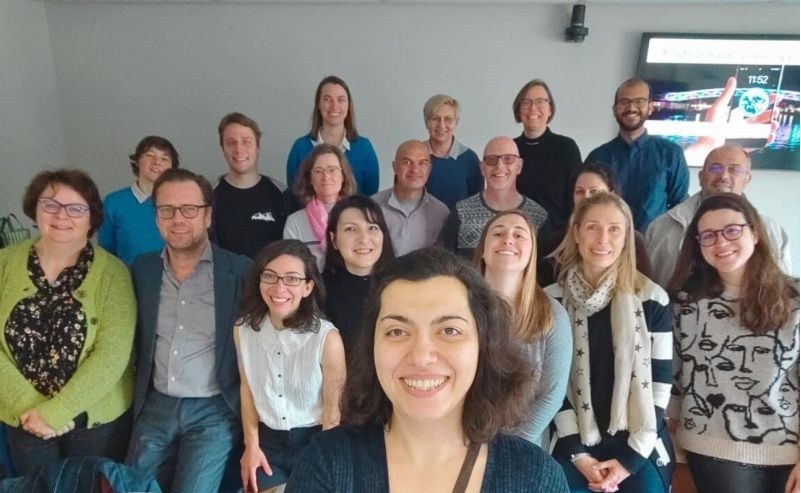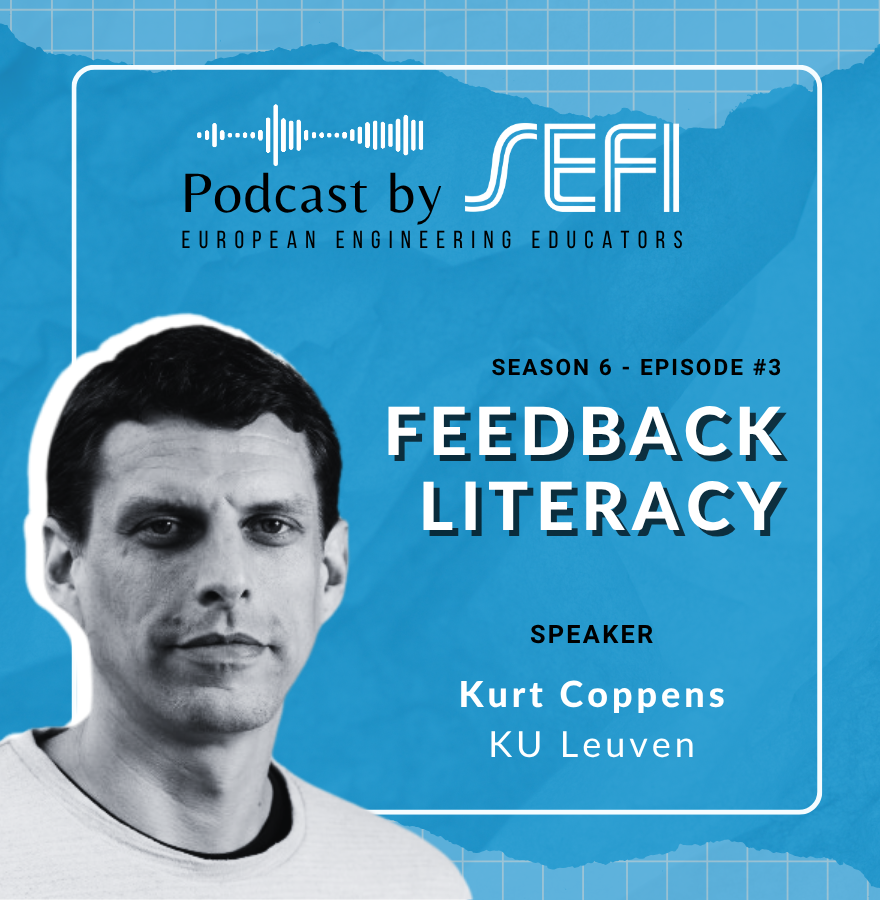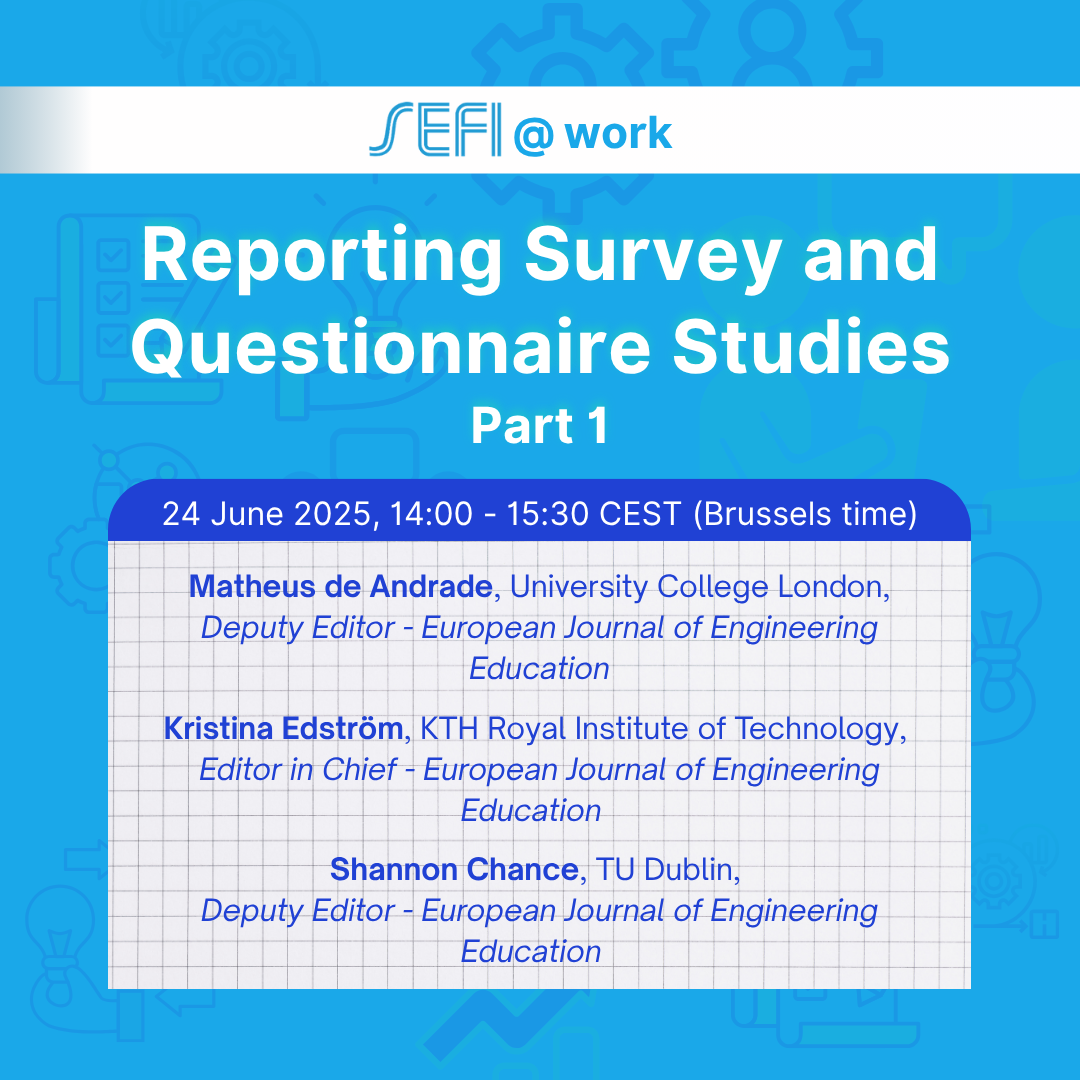Feedback is a somewhat perennial topic within higher education (HE), with increasing emphasis on students…
Growing the field of engineering ethics education and research as a community

Date: 24-26 March 2025 (9:00-17:30 each day)
Location: Royal Marine Hotel, Dún Laoghaire, Ireland
Organiser: Shannon Chance (shannon.chance@tudublin.ie)
Capacity: 50 participants maximum
With a focus on celebrating The Routledge International Handbook of Engineering Ethics Education (RIHEE) – and extending and applying its themes – the 2025 SEFI Ethics Spring Symposium/school will explore what is in the handbook and prospects for developing the field further. The Handbook will be available in digital format (open access, free of charge) and hardback (for sale) around New Year’s Day!
The Symposium strives to bring diverse voices together to collaborate as a community on ways forward. Engineering ethics teachers and researchers from every career stage and any part of the world are welcome, authors of the forthcoming Handbook and non-authors alike, those new to the SIG, and ongoing engineering ethics contributors.
The SEFI Ethics Special Interest Group cordially invites you to submit an expression of interest at this survey link by 20 December 2024!
Crucial dates:
- 20 December – expression of interest due
- 14 January – the symposium organizers will issue acceptance/invitations
- 10 February – we have rooms blocked with the hotel at a reduced rate; however, the hotel will release the rooms to the general market on this date, so please book prior
- 21 January – invited participants to confirm the intention to attend
- 14 February – organisers issue finalized schedule
- 24 February – hotel room cost becomes un-refundable
- 24-26 March – symposium
Registration: There will be no registration fee, with the host covering the organisational costs and soup & sandwich lunches daily. To preserve the intimate nature of past Ethics Spring Schools, we will cap attendance at 50 (max) participants.
Transportation: The Royal Marine Hotel can be reached by AirCoach via Dublin airport in 40 minutes.
Venue: Details about the venue (hotel and meeting rooms) are available here. Participants will need to book and pay for their own hotel rooms; the room rate is €145/night (single room) or €160/night (double room). This room rate includes breakfast and access to the Pier Health Club. When making your room booking, you will be required to provide a valid credit card or debit card. In January, the organizers will provide invited participants with a hotel booking discount code.
Scholarships/bursaries: Please contact the co-chairs Diana Martin (diana.martin@ucl.ac.uk) and Mircea Toboșaru (mircea.tobosaru@upb.ro) if you need assistance. For example, the SEFI Ethics SIG and the local host may offer travel support for participants from countries underrepresented in SEFI (Eastern Europe, Balkans, Baltic area) or in situations that may make attendance difficult.
Preliminary schedule:
Monday
09:00 Welcome plenary
10:00 Workshop/discussion 1
11:15 Coffee break
11:45 Handbook panel 1 (SECTION 1: Foundations)
12:45 Lunch and walk
14:30 Workshop/discussion 2
15:45 Coffee break
16:15 Handbook panel 2 (SECTION 2: Interdisciplinary)
17:15 Day’s wrap-up
Tuesday
09:00 Keynote
10:00 Workshop/discussion 3
11:15 Coffee break
11:45 Handbook panel 3 (SECTION 3: Specific Disciplines)
12:45 Lunch and walk
14:30 Workshop/discussion 4
15:45 Coffee break
16:15 Handbook panel 4 (SECTION 4: Teaching Methods)
17:15 Day’s wrap-up
Wednesday
09:00 Handbook panel 5 (SECTION 5: Assessment)
10:00 Workshop/discussion 5
11:15 Coffee break
11:45 Ethics SIG meet-up
12:45 Lunch and walk
14:30 Handbook panel 6 (SECTION 6: Accreditation)
15:30 Coffee break
16:15 Workshop/discussion 6
17:15 Symposium send-off
Format: The SEFI Ethics Spring Symposium maximises opportunities for interaction, discussion and exchange. The spring school will give a space for those interested in the topic of engineering ethics education to map out, problematise, combine, and co-create new approaches to teaching and researching engineering ethics. For this, the Symposium invites contributions in two main types of sessions:
- Panel discussions dedicated to each section of the Handbook
There will be six panels, one per theme of the Handbook. We will ask about four people to serve as panellists on each theme. The panellists for the given theme will be asked to read and provide a thoughtful, critical response to the theme’s content. The organisers intend that each panel will include people who did not author for the Handbook as well as people who did, although no person will be assigned as a panelist for a section they have authored on.
You have the chance to rank your preferred themes via the survey form.
The sections and the chapters they encompass are:
SECTION 1: Foundations of engineering ethics education
1 The purposes of engineering ethics education
2 Ethical theories
3 Individual and collective dimensions of ethical decision-making in engineering
4 Reason and emotion in engineering ethics education
5 Professional organizations and codes of ethics
6 A post-normal environment-centered approach to engineering ethics education
7 Engineering ethics education and artificial intelligence
SECTION 2: Interdisciplinary contributions to engineering ethics education
8 Engineering ethics education through a critical view: Some philosophical foundations
9 Sociological, postcolonial, and critical theory foundations of engineering ethics education
10 Psychological foundations of engineering ethics education
11 Organization studies and engineering ethics education: Response-able engineering and education, situating ethics-in-practice
12 Ethics and engineering design foundations
13 Law in engineering ethics education: An exploration
SECTION 3: Ethical issues in different engineering disciplines
14 Ethical considerations in civil engineering
15 Ethical issues in mechanical and aerospace engineering
16 Ethical issues in electronic and electrical engineering
17 Ethics in chemical engineering
18 Ethical issues in software engineering
SECTION 4: Teaching methods in engineering ethics education
19 Literature review of teaching methods: Trends and ways forward to support engineering ethics instruction
20 Teaching ethics using case studies
21 Embedded ethics in problem design: The case of problem-based learning in engineering and science
22 Teaching responsible engineering and design through value-sensitive design
23 Ethics in service-learning and humanitarian engineering education
24 Arts-based methods in engineering ethics education
25 Reflective and dialogical approaches in engineering ethics education
SECTION 5: Assessment in engineering ethics education
26 A framework for the assessment of ethical competencies and affective dispositions
27 Assessing attitudes and character in engineering ethics education: Current state and future directions
28 Employing epistemic micro-practices to assess progress and barriers in engineering students’ ethics development
29 Aspirations for ethical education in engineering curricula envisioned through the quality lens of Goodlad’s typology
30 Assessing engineering ethics education leveraging stakeholder engagement in engineering programs
31 Two criticisms of engineering ethics assessment: The importance of behaviors and culture
SECTION 6: Accreditation and engineering ethics education
32 Foundational perspectives on ethics in engineering accreditation
33 Contextual mapping of ethics education and accreditation nationally and internationally
34 Accreditation and licensure: Processes and implications
35 A feminist critical standpoint analysis of engineering ethics education and the powers at play in accreditation, research, and practice
36 Accreditation processes and implications for ethics education at the local level
Panellists will be asked to read and review the thematic section of the Handbook that they are matched with and will have 2+ months to read the chapters in the section.
- Active learning workshops or Active thematic discussions
There will be 12 active learning workshops or active thematic discussions, with 2 parallel tracks (i.e., 2 running at a time), and 2-4 participants will facilitate each session. These sessions won’t necessarily focus on the Handbook. You can propose a contribution and your preferred co-facilitator(s) using the short survey form.
Possible topics for the active learning workshops and active discussions include:
- The Routledge International Handbook of Engineering Ethics Education: applications, gaps, prospects
- Capacity building in the engineering ethics education and research community
- Collaborative and interdisciplinary approaches to engineering ethics
- Engaging stakeholders in the implementation and teaching of engineering ethics
- Engineering for human rights, equality and social justice
- Decolonising engineering education
- Environmental ethics and sustainability
- Value-sensitive engineering education
- Rethinking the responsibility of engineers and technological universities
Participants are welcome to suggest other themes and topics outside these strands.
Besides these formal activities, the Symposium will include time in nature and informal moments.
For more information on the 2025 Symposium, please contact the organiser, Shannon Chance (shannon.chance@tudublin.ie).

